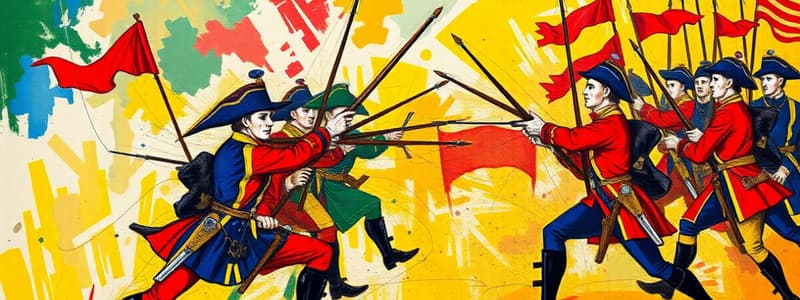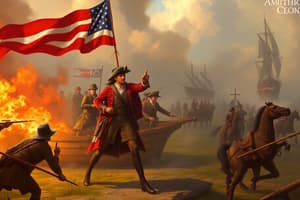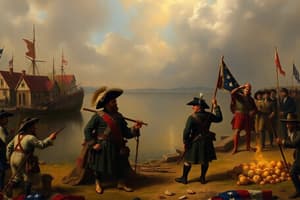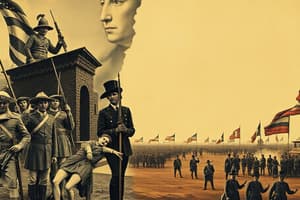Podcast
Questions and Answers
What was one major disadvantage for the American forces at the start of the war?
What was one major disadvantage for the American forces at the start of the war?
- Strong leadership
- Limited funding (correct)
- Support from France
- Familiarity with the land
The British underestimated the American forces at the start of the Revolutionary War.
The British underestimated the American forces at the start of the Revolutionary War.
True (A)
Name one key advantage that the American forces had during the Revolutionary War.
Name one key advantage that the American forces had during the Revolutionary War.
Familiarity with the land
The Americans built ___________ to protect themselves from British attacks.
The Americans built ___________ to protect themselves from British attacks.
Match the following leaders to their contributions during the Revolutionary War:
Match the following leaders to their contributions during the Revolutionary War:
Which country provided significant resources and naval support to the Americans during the Revolutionary War?
Which country provided significant resources and naval support to the Americans during the Revolutionary War?
What motivated the colonists to fight in the Revolutionary War?
What motivated the colonists to fight in the Revolutionary War?
The American forces had a total of 72,000 soldiers at their disposal at the beginning of the war.
The American forces had a total of 72,000 soldiers at their disposal at the beginning of the war.
Flashcards
American Motivation in the Revolutionary War
American Motivation in the Revolutionary War
The American colonists fought for their freedom and the right to establish their own country. They were motivated by a desire to protect their way of life and defend their homes.
American Strategy in the Revolutionary War
American Strategy in the Revolutionary War
American soldiers used boulders to slow down British troops, built fortifications for protection, and surrounded British troops in strategic locations. They also knew the land better than the British, giving them a crucial advantage.
George Washington's Leadership
George Washington's Leadership
George Washington's leadership kept the Continental Army motivated, sharing in their hardships, and promoting unity. He also hired talented individuals like Baron von Steuben to train the army.
Baron von Steuben's Contributions
Baron von Steuben's Contributions
Signup and view all the flashcards
John Paul Jones' Leadership
John Paul Jones' Leadership
Signup and view all the flashcards
French Alliance
French Alliance
Signup and view all the flashcards
Spanish Alliance
Spanish Alliance
Signup and view all the flashcards
Marquis de Lafayette's Contribution
Marquis de Lafayette's Contribution
Signup and view all the flashcards
Study Notes
Initial Odds/Positions in the Revolutionary War
- American Advantages: Defensive position, familiarity with the terrain, British distance from home, British underestimation of American resolve, strong motivation from colonists defending their homes and freedoms.
- American Disadvantages: Significantly smaller army (20,000 vs 72,000 British soldiers), lack of funding, disorganized military, insufficient formal military training, difficulty recruiting adequate troops.
- British Advantages: Powerful and well-equipped army, employment of mercenaries.
- British Disadvantages: Lack of familiarity with the terrain, great distance from home base.
Factors Contributing to American Victory
- Motivation: A strong desire for freedom, independence, and self-governance drove the American colonists. Mercenaries were motivated by financial gain, while the British sought control.
- Strategy: Utilizing the land advantage, building fortifications, and employing tactics like surrounding forces (e.g., Battle of Saratoga, Yorktown). The knowledge of the terrain was crucial for American success.
- Leadership: George Washington's inspiring leadership, dedication to the troops, and effective recruitment of skilled personnel (like Baron von Steuben) were crucial. Von Steuben's training improved the army's discipline and confidence. John Paul Jones displayed heroic and strategic naval leadership.
- Alliances: France and Spain provided crucial financial, material, and naval support for the American cause, diverting British resources. Allies recognized British dominance as a threat to their own interests or territories.
- Key Figures: General Marquis de Lafayette (continental Army) contributed significantly to the American cause.
Key Military Terms
- Desertion: Leaving a military post without permission.
- Alliance: A formal agreement between multiple parties for mutual support.
- Mercenary: A soldier who fights for payment, typically for a foreign country.
- Republic: A government form where citizens elect representatives.
- Privateer: A private ship authorized to engage in warfare by a state.
- Provisions: Resources, supplies, or legislative acts in support.
Studying That Suits You
Use AI to generate personalized quizzes and flashcards to suit your learning preferences.




